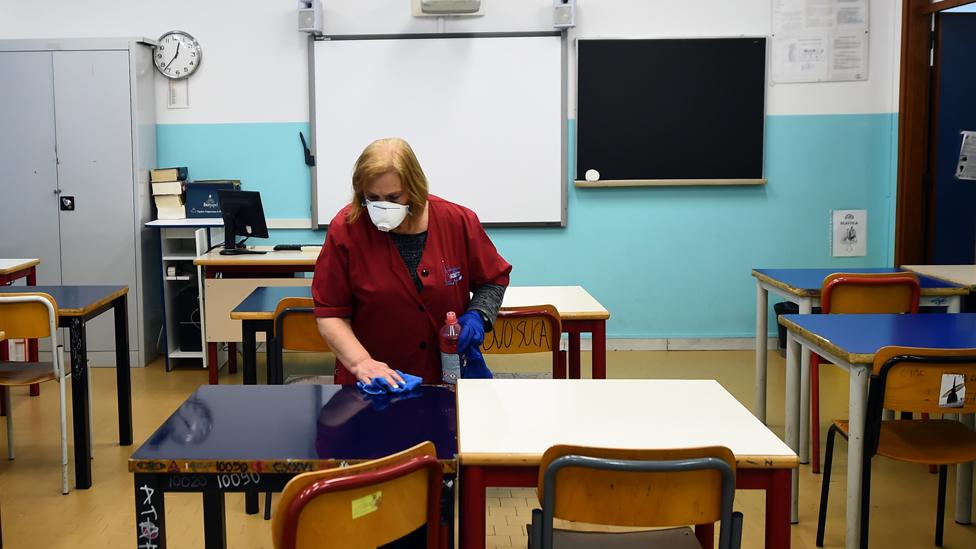Coronavirus: Death toll jumps again in Italy's 'darkest hour'
- Published
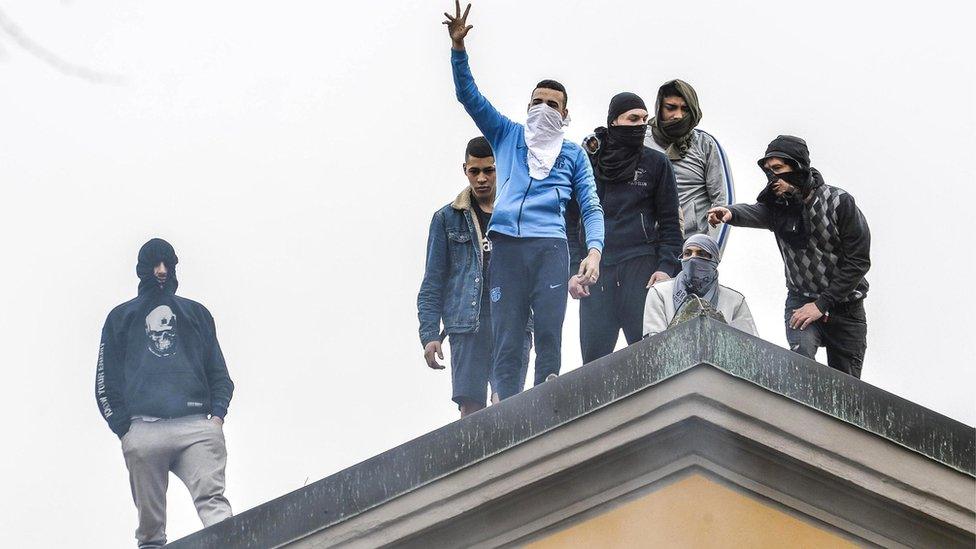
Detainees protest on the roof of the San Vittore prison in Milan
Italy's coronavirus death toll has jumped by 97 to 463, as Prime Minister Giuseppe Conte described the outbreak as the country's "darkest hour".
The number of confirmed infections in Italy also increased to 9,172, up from 7,375 on Sunday, official figures show.
Italy is the worst-hit country after China, with cases of the virus confirmed in all 20 Italian regions.
Earlier on Monday, six inmates died amid riots at prisons across Italy after authorities suspended all visits.
Italy's government has pledged to further increase spending to offset the economic impact of the outbreak as the country struggles to adapt to the most restrictive limits on movement since World War Two.
Up to 16 million people in northern Italy now need permission to travel under quarantine rules.
In an interview with La Repubblica newspaper on Monday, Mr Conte said: "These days, I have been thinking about the old speeches of [Winston] Churchill - it is our darkest hour but we will make it".

EASY STEPS: What can I do?
A SIMPLE GUIDE: What are the symptoms?
IMMUNITY: Are women and children less affected?
MAPS AND CHARTS: Visual guide to the outbreak
VIDEO: The 20-second hand wash

The coronavirus causes the Covid-19 disease. In severe cases, patients have pneumonia, severe acute respiratory syndrome, and multiple organ failure that can lead to death.
What happened at the prisons?
The trouble began in the northern city of Modena after inmates at the Sant'Anna prison were told that all visits had been suspended.
Three people were reported to have died at the prison, while a further three died after being transferred from there.
It is thought that at least two of the dead lost their lives to drug overdoses after they raided a prison hospital for the heroin substitute methadone.
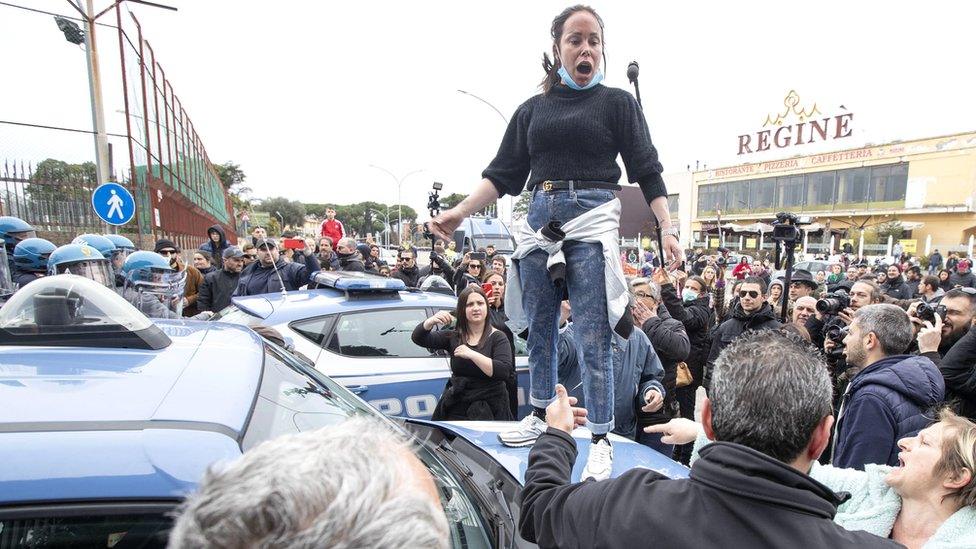
Relatives of inmates at the Rebibbia prison in Rome protest at being denied entry
At San Vittore prison in Milan, detainees set fire to a cell block on one of the facility's six wings, then climbed onto the roof through windows and started waving banners, officials said.
At a prison in the southern city of Foggia, about 20 inmates managed to break out of the building during protests. Many were quickly recaptured, Italy's Ansa news agency reported.
There were also riots at several other prisons in northern Italy and at facilities in Naples and the capital, Rome.
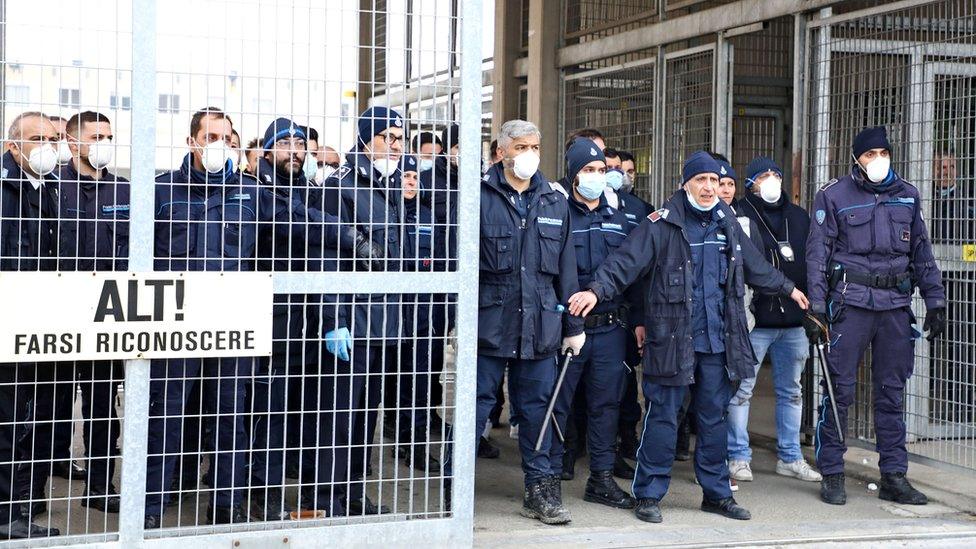
Officers guard the entrance of the Sant'Anna prison in Modena as prisoners' relatives protest
How is the government responding?
On Monday, Mr Conte said the government would pump in more money to mitigate the impact of the outbreak.
He also said Italy would overcome the virus if people followed the rules, adding that the sacrifices required were for the good of all.
Milan quarantine resident: "It's really important to be responsible in this moment"
Italy is also seeking measures at EU level.
On Monday morning, the main share index in Milan, the industrial powerhouse at the heart of the worst-affected area, opened down more than 8%.
What are the restrictive measures?
The strict new quarantine measures will last until 3 April, the government says.
They affect a quarter of the Italian population, and centre on the rich northern part of the country that powers the economy.
The restrictions apply to Lombardy and 14 other provinces: Modena, Parma, Piacenza, Reggio Emilia, Rimini, Pesaro and Urbino, Alessandria, Asti, Novara, Verbano Cusio Ossola, Vercelli, Padua, Treviso and Venice.
The UK Foreign Office advises against all but essential travel to these areas.
All schools and universities in the area are shut, as well as museums, cinemas and swimming pools.


The government says only those with a serious work or family reason that cannot be postponed will be allowed in or out of the quarantine zone.
Passengers departing on flights, except temporary visitors, will have to justify themselves, as will all those arriving by plane.
There are controls at train stations to check temperatures.
Cruise ships are forbidden to dock in Venice.
The health system is under immense strain in Lombardy, a northern region of 10 million people where Milan is the main city. Regional hospitals are running short of beds and treating patients in corridors.
The health ministry says the average age of deaths from the coronavirus is 81.4 years.
Italy has one of the world's oldest populations. The virus is particularly dangerous for the elderly and those with underlying health conditions.
World Health Organization (WHO) chief Tedros Adhanom Ghebreyesus has praised Italy for making "genuine sacrifices".
Until Sunday only about 50,000 people in northern Italy had been affected by quarantines.


On Sunday, we drove up to the edge of the exclusion zone. We were expecting to see roadblocks or controls in place and we didn't see anything at all.
Cars were going in both directions. It seemed as though the control of this restricted zone was quite loose, and that was a bit difficult to understand.
Is this simply too big an area to control and close off in the heart of Europe, or are the restrictions gradually coming into place?
We've seen pictures from inside the restricted cities, and the streets are very deserted, but we're not seeing police checkpoints as such.
But perhaps this is going to be stepped up in the coming days because there are even penalties of three months in prison or a fine of €206 (£179; $235) for breaking the rules.
The real fear is that, in the hours between the quarantine being announced and it coming into effect, people have gone from more infected areas in the north down south.
There are healthcare facilities in southern Italy, far less developed than those here in the north, that are going to seriously struggle.

What is the situation elsewhere?
The number of infections worldwide is now more than 111,000, with about 3,890 deaths.
China, which has recorded the highest number of fatalities, reported just 40 new cases of Covid-19, the lowest since 20 January.
Although this indicates that the spread there is slowing, senior officials warned against reducing vigilance.

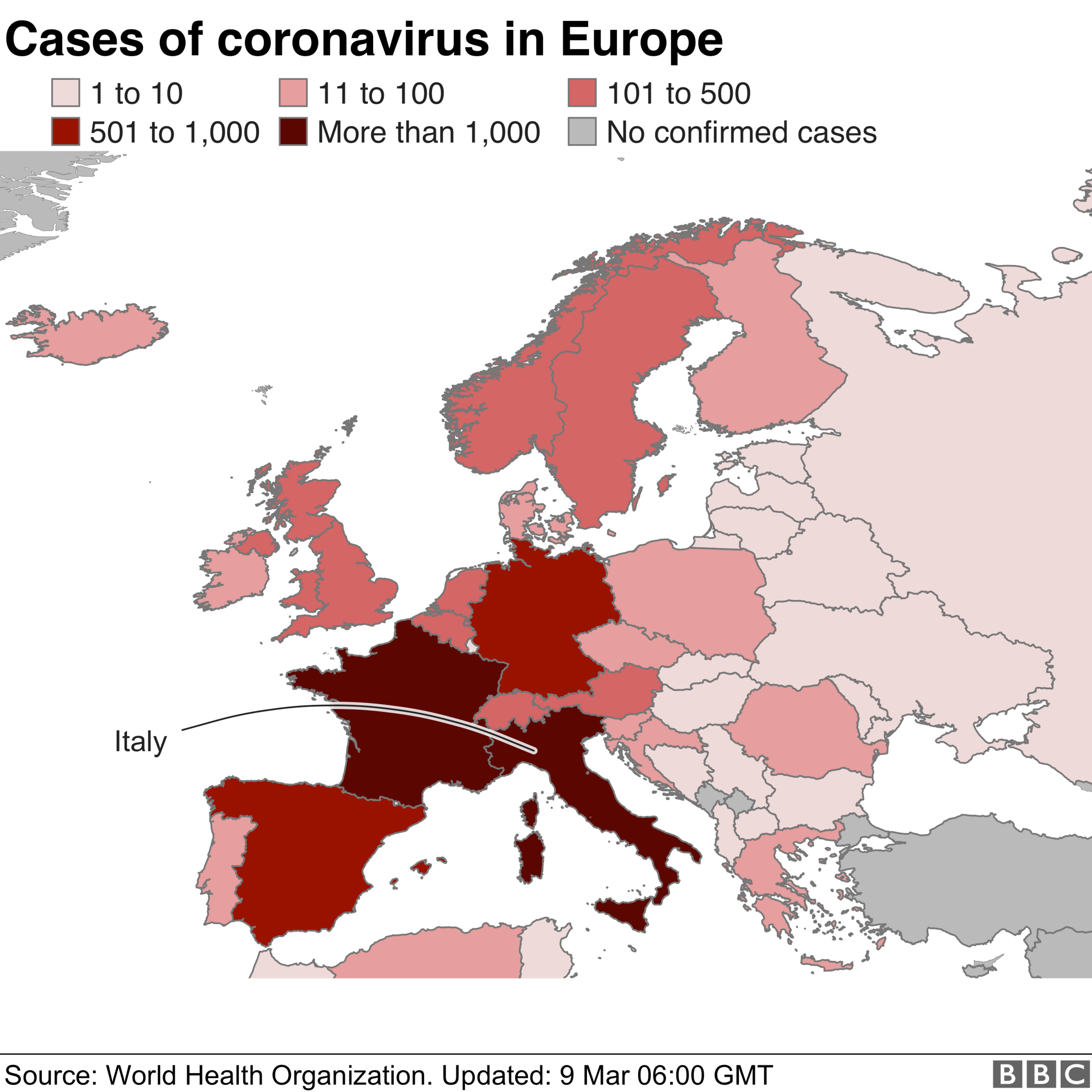

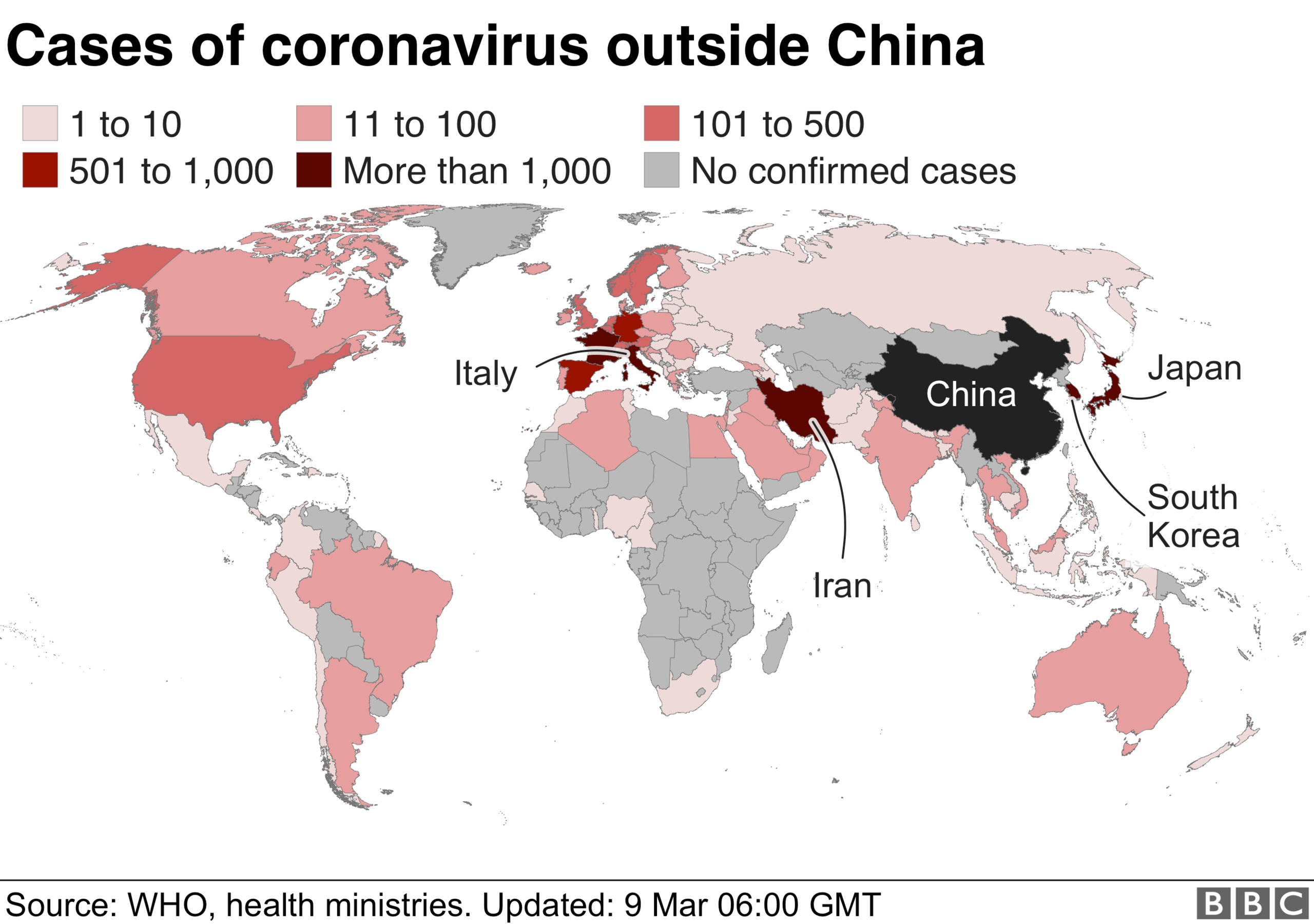

In other developments:
South Korea officials reported the lowest daily increase in two weeks
Iran confirmed 7,161 infections and 237 deaths, however the real figures are feared to be much higher
In France, two more lawmakers tested positive, officials said on Sunday
In the US, the number of confirmed cases exceeds 500
A cruise ship that was barred by Malaysia and Thailand over coronavirus fears will be allowed to dock in Singapore
Pope Francis on videolink address: "The Pope is caged in the library"

Have you or someone you know been affected by coronavirus? Share your experiences by emailing haveyoursay@bbc.co.uk, external.
Please include a contact number if you are willing to speak to a BBC journalist. You can also contact us in the following ways:
WhatsApp: +44 7756 165803
Tweet: @BBC_HaveYourSay, external
Send pictures/video to yourpics@bbc.co.uk, external
Please read our terms & conditions and privacy policy
- Published6 October 2021

- Published6 March 2020
